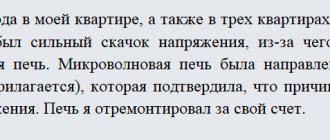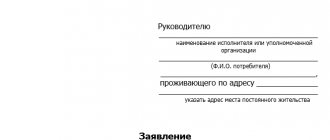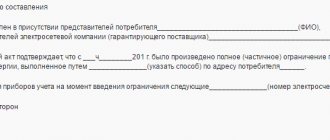Homeowners rarely throw away bills and utility receipts. This is not a useless habit from the past, but a reliable help for those who are accustomed to order in financial matters. Receipts can be useful in many cases:
- The amount of monthly payments suddenly increased. You can always compare receipts for several months and data from meters to understand why expenses have increased;
- The management company illegally inflates the bill. Sometimes the list includes services that the organization does not provide, or it adds a markup to the tariff. In this case, you should check the management company;
- I urgently needed important data. The personal account number, apartment area, benefits, as well as contacts of housing and communal services suppliers are indicated in the receipt;
- the payment was not received into the account of the management organization. The problem may be due to a computer glitch or operator error. In any case, a canceled receipt is a reliable argument;
- need to sell the apartment. To receive a certificate of no debt from the MFC or HOA, you need to provide several months of “payments”.
Storage period for payment receipts
The storage period for utility payment receipts is not regulated by any legal act. Payment documents of this kind are subject to the statute of limitations, which expires after 3 years. Hypothetically, the court may accept the claim later, but if this is stated, the law will be on the tenant’s side.
Information on the receipt
Receipts are intended for financial payment, so it is important that the receipts are in the exact form approved by law.
There are a number of data that must be included in the receipt for payment of utility services, namely:
- Types of communal resources. The type of good consumed must be indicated, not the general name.
- Consumption standards.
- Requisites. The receipt must indicate the bank details of the company where the money is transferred.
Management companies rarely give recommendations to residents regarding the storage of receipts, so that in the event of a dispute they have an advantage in evidence over the owner. Payment for consumed resources is made monthly. The homeowner receives a receipt indicating how many resources were consumed and how much he needs to pay for the services provided. If the money is not deposited within the prescribed period, then the person becomes a debtor.
But if the reason for the lack of money is, for example, a technical failure, then such debt can be canceled in court. If the payment was made in full, but it did not reach the account and the person lost the receipt, then the citizen will not be able to prove the fact of payment and will have to pay a second time for the service received.
Legislative aspect
The procedure for providing payment documents to apartment owners, the information that must be reflected in them, and the list of data that is prohibited from being posted are recorded in the following documents:
- Housing Code of the Russian Federation (Article 155);
- Decree of the Government of the Russian Federation No. 354 (clause 69);
- Order of the Ministry of Construction of the Russian Federation dated January 26, 2018 No. 43/pr;
- Letter of the Ministry of Construction of the Russian Federation dated June 21, 2018 No. 27125-OG/04;
- Federal Law No. 38;
- Code of Administrative Offenses (Part 1, Article 14).
None of these regulations mention the retention period for utility receipts.
RF PP No. 354 regulates what information should be contained in payment documents: about the premises, service provider, charging, etc.
The Order of the Ministry of Construction of the Russian Federation No. 43/pr approved the approximate form of the receipt.
According to Letter of the Ministry of Construction of the Russian Federation No. 27125-OG/04, the management company has the right to swap blocks and place in them additional information approved at the general meeting of owners.
Federal Law No. 38 “On Advertising” categorically prohibits placing advertising messages on receipts, including on the reverse side. The only exceptions are social advertising and reference information - for example, about sites where you can pay for housing and communal services.
The Code of Administrative Offenses establishes fines for violation of Federal Law No. 38 and Order of the Ministry of Construction No. 43/pr.
What kind of receipts are we talking about?
A receipt is a document drawn up in accordance with established standards and confirming the fact of payment for services.
The form of the payment document is described in Order No. 924 of the Ministry of Construction and Housing and Communal Services of the Russian Federation. Everything is described in detail in the receipt: there is a separate line for each resource, and consumption rates for each utility service are given. Thanks to this, you can check whether the payment amount has been calculated correctly and control your expenses.
Despite the fact that the standards described in the Order are only approximate, in most cases the receipts look the same. This makes working with this type of document easier.
So, you paid for utilities and received a receipt. What to do next? We need to save it.
When can you throw away receipts?
Many people are looking for where to look at the requirements for utility payment receipts. Basically, tenants are interested in when they can throw away their canceled payments. But there are no deadline requirements as such. Since “payments” for housing and communal services are subject to a statute of limitations law, after 3 years you may no longer need them. But lawyers recommend approaching this issue carefully and, if possible, not throwing away these papers for another 2-3 years.
Storage order
To ensure proper records and to be able to find the required documents if necessary, papers should be stored taking into account the following recommendations:
- receipts must be placed in separate folders, depending on the recipient of the payment;
- documents are laid out in chronological order, with newer payments placed on top and stapled;
- each year is completed separately.
If a consumer pays simultaneously for housing and communal services to several addresses, these payment bills should not be mixed. Receipts must be divided, placing separate documents for each apartment. Orderly placement of documentation will make it easy to find the necessary paper, if necessary.
Properly organized storage of housing and communal services bills will allow you to confirm the deposit of funds, excluding claims from utility organizations. And a properly organized storage order will ensure a quick search for papers if the need arises.
Do I need to keep receipts for more than 3 years?
The main reason why experts insist on keeping payment documents is that they have legal force. In the event of a conflict with the service provider, the user, with the help of a receipt, will be able to prove that he is right.
You can file a claim within 3 years. Following the logic, you can then throw away unnecessary papers. But it is still not recommended to do this, especially if the tenant has had rent arrears in the past.
There have been precedents when management companies sued defaulters without their knowledge. At that time, the statute of limitations had not yet expired, but for some reason the process was suspended and resumed after 3 years. However, in this case the law does not apply, and the defendant is obliged to appear in court. In such a situation, saving receipts will help you win your case. So it’s up to everyone to decide for themselves how long to keep utility bills, but it doesn’t hurt to take reasonable precautions.
Of course, documents have legal force only if they fully comply with the requirements:
- the displayed data is current;
- the invoice is drawn up in accordance with established rules;
- the receipt is filled out correctly;
To avoid conflicts, you should not delay rent payments and accumulate debts. On our website you can pay for housing and communal services without commission or queues.
Save even a blank receipt.
There is no point in printing out receipts immediately after paying for housing and communal services on the Internet, experts say.
However, it is necessary to save the payment receipt on your computer so that you can print it out if any problems arise. This document does not have legal force, but it contains payment details and, by presenting a printout at the bank, you can receive a document with stamps indicating that the payment was made on time. If there is no receipt, you will have to remember on what dates, where and from which card you paid the rent. “Payment data is usually stored in the bank’s personal account. But it’s still worth saving receipts on your home computer in case of technical failures,” notes Alexey Koitov, head of the legal service of the representative office of the Union of Consumers of the Russian Federation in the Northwestern Federal District. “Even if the bank where you paid closes, information about the payment, knowing its details, can be restored through the Bank of Russia system or the tax service.”
If you pay through a terminal or some other electronic method, enter your phone number or email address at the request of the device to receive an electronic receipt for payment. If you didn’t enter it, it means you refused to receive the check.
Often, a management company or settlement center offers payment for housing and communal services through its website. Is it worth using this housing and communal services and urban environment” Dmitry Gordeev. — If she recalculates every six months and delays in explaining payments, then I don’t recommend using this service. It is better to pay for housing and communal services through a reliable bank, where you can also, if necessary, confirm a transaction that “did not go through.”
If you receive payments electronically, save this still unpaid receipt. “There is a possibility that the organization that sent it to you will retroactively change the numbers in the payment slip,” Gordeev points out. “And later you will have to prove that the bill was exactly what you paid.”
Why keep paid receipts?
In many cases, saved paid receipts are a friend and savior that will help:
- Check your own consumption of water, gas, electricity and heat. If the amount in receipts has increased, but there has been no increase in tariffs, then you should compare receipts for recent months - perhaps they incorrectly reflected meter readings or the subscriber himself exceeded the consumption of energy resources.
- Monitor the management companies - whether services were provided in full, whether the approved tariffs were not inflated, whether the meter readings were correctly reflected and the amount payable was calculated, whether subsidies and benefits were taken into account, etc. It is no secret that sometimes utility companies act unlawfully they inflate bills, and if this is discovered when comparing receipts for the last few months, then compensation can be recovered from the service companies through the court - up to 50% of the excess amount.
Some unscrupulous management companies are not averse to making money on the carelessness of citizens - extra lines appear on receipts, and additional services are “quietly” added to the housing tariff, which increases the monthly payment by a fairly large amount - Save important contacts for subscribers - the receipts indicate the phone numbers of housing and communal services providers, so you can submit a request for repairs, for example, of a porch, bench or entrance directly from home. Of course, the necessary information can be found on the Internet, but since such organizations are often local, they may simply not have a website.
- Prove payment if payment for the previous period is not reflected in the current receipt. Human factor or computer failure is often the reason why money paid for utilities does not reach the service providers. After some time, the management company will demand that the debt be repaid along with late fees, and only saved paid receipts will help dispute the existence of the debt.
- Sell the apartment. Legally, debt to housing and communal services enterprises is not an obstacle to the sale of real estate, but not every buyer will want to purchase housing encumbered with debts. Therefore, vigilant realtors or buyers usually request a certificate of absence of debt or an extract from the seller’s personal account before signing a contract. And if for some reason the information was not saved by the management company, then receipts for payment for housing and communal services will confirm the “cleanliness” of the living space being sold/purchased.
Video: why save utility bills
Storage Features
Receipts and checks act as proof that the citizen has actually paid for the use of utilities. If for some reason the Criminal Code requires a repeated deposit of funds, the citizen will be able to confirm that unfounded claims are being made against him.
Warning
It is recommended to store papers for no more than 5 years, and the statute of limitations is 3 years, so during this period receipts may be needed, and after this period the papers can be thrown away.
Reasons for storage
Over time, management companies change, homeowners associations are created and dissolved, and the transfer of balances from one organization to another is not always correct. Supporting documents will help you prove that there is no debt and everything has been paid. Sometimes the organization’s system itself distributes payments incorrectly to payers - the amounts are lost. There may be software glitches. Errors cannot be ruled out when transferring funds by banks.
In case of disputes, payment documents serve as proof of the deposit of funds by consumers into the account of the management company. For legal proceedings, the fact of payment is important - according to the law, the consumer is obliged to prove payment, and without the appropriate document it will not be possible to justify himself.
Form of the document and its contents.
The receipt form has a form approved by law listing the services and resources provided to the owner.
Each type has a separate line highlighting:
- Electricity.
- Hot and cold water supply.
- Gas supply.
- Heating.
- Housing and communal services - use of elevators, intercoms, maintaining cleanliness of the territory, repairs, etc.
Each column corresponds to consumption standards established in a particular region. In addition, for the convenience of making payments through bank terminals, all payers are assigned an individual code, represented by a set of numbers.
The payment also contains other important information:
- Full name of the owner and his personal account.
- Shared or full ownership.
- Type of real estate owned by a citizen.
- Details of the organization receiving the payment.
- Number of services.
- Norms of their consumption and tariffication.
- Previous paid amount.
- Meters data.
- Debt or lack thereof.
- Information about debt payment in installments.
Is keeping utility bills required by law?
Keeping receipts for utility bills is not a legal requirement. Moreover, management companies do not even give such recommendations to service users in order to be able to win in court in the future.
The easy step of placing documents in different folders can help in case of misunderstandings related to the payment of various servants. If such circumstances arise, it is enough to contact the management company with a receipt and show that the payment actually was made.
Experts in this matter recommend storing documents for 5 or even 6 years, although lawyers take a different point of view and indicate a period of 3 years.
Payment Methods
The consumer has the right to pay bills in a convenient way:
- cash at the cash desk;
- to the bank in cash according to a receipt, non-cash from an account - card, personal;
- using online services and payment systems.
Regardless of the application method, there are general recommendations:
- Make sure that the details of the payer and recipient are indicated correctly (pay special attention to the payer’s personal account number, his last name, first name, patronymic, address).
- Check the deposited/transferred amount.
- Receive a proof of payment - a check, a receipt, an electronic check.
If it is absent, make sure that the money for the consumed resource has been received by the supplier (the invoice includes lines about the debt at the beginning of the period and the amounts paid, after which the total amount payable is reflected, taking into account payments).
How to properly store paper documentation?
The legislation does not have any special requirements for storing documentation, nor do utility companies. It is important here that citizens follow several unwritten rules:
- Receipts should be distributed by month and year, or by type of accrual. Place each pack in plastic envelopes to protect them from moisture or other negative factors.
- It is better to store payments in a closed box so that direct sunlight does not fall on the documents. The ink they are printed with tends to fade. If you store receipts in the sun, then after a few months nothing will be visible on the pieces of paper.
- It is better to place documents higher in order to protect receipts from possible flooding. Sometimes children can play with pieces of paper and leave only scraps of them.
All these tips will help keep your documents safe and sound. Most likely, they will not be useful to citizens, but still, it is better to play it safe and avoid problems in the future.
Legal requirements
For the provision of utility services, a fee is charged depending on the amount of resources consumed. For this purpose, the readings of individual meters, as well as the general house meter, are taken into account. Service fees are paid every month.
A receipt and check act as confirmation of the citizen’s fulfillment of his duties. If a person does not pay for a service, then he is represented as a debtor. But sometimes a situation arises when a citizen deposits money according to a receipt, but it does not reach the management company. The culprit may be an employee of the management company, and often this problem arises for technical reasons. Therefore, only with the help of a check and receipt will the payer be able to prove that he paid for the services used.
Receipts are sent directly by the management company, and they must meet the requirements specified in Order No. 924. It provides not only the content of the document, but also its appearance. Additionally, instructions are described on the basis of which the documentation is filled out. If these requirements are met, then the document has legal significance.
Information
The form of the receipt changes from time to time.
In 2021, the document must contain the following information:
- types of resources for which payment is made;
- resource characteristics;
- quantitative indicators represented by the number of services consumed;
- details for making payments;
- consumption standards approved in the LCD or PP;
- general information, which includes the full name of the citizen in whose name the receipts are received, the address of the apartment, as well as information about the management company provided by the BIC and TIN.
Citizens, using information from receipts, will be able to check the correctness of the payment.
If the receipt received by the apartment owner does not meet the requirements, then there is no need to pay or keep it, since this documentation has no legal force.









